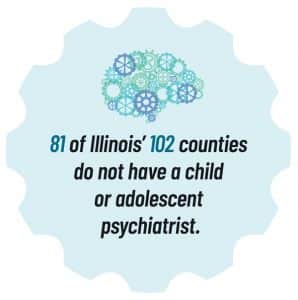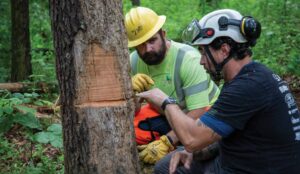Growing up in central Iowa, Josie Rudolphi remembers the stress and anxiety she would see in the faces of her father and other farmers. The worries and concerns made an impact on her – so much so that she pursued an interest in helping others in rural areas with mental well-being.
Rudolphi, now an assistant professor of agricultural and biological engineering who specializes in farm safety and mental health at the University of Illinois, says emotional and behavioral wellness is a key component of being well – just as much as how we feel physically.
She says people often associate the phrase “mental health” with mental illness or psychological conditions, but in reality, mental well-being reaches across a gamut of ways we think and feel about ourselves and our world. It includes emotions ranging from contentment and happiness to daily concerns and depression.
“We really have to care about mental health because there are interactions between our mental and physical health. It is a quality of life issue,” Rudolphi says.
 Luke Raymond, director of behavior health at Peoria-based OSF HealthCare Systems which has facilities across the state from Rockford to Alton, says there is an undeniable relationship between physical and mental health.
Luke Raymond, director of behavior health at Peoria-based OSF HealthCare Systems which has facilities across the state from Rockford to Alton, says there is an undeniable relationship between physical and mental health.
“Mental health is our overall sense of how we’re doing mentally, emotionally, spiritually and behaviorally,” he explains. “There is a correlation between positive mental health and other positive health outcomes. We know from decades of research that the more mentally well and emotionally stable we are, the better all our other health conditions are as well. Of course, the inverse is true, too. It all goes hand-in-hand with our physical health.”
Unfortunately, the understanding and approach to mental well-being seems different in rural areas as opposed to more urban settings.
“We acknowledge that for us in rural areas, there are some barriers to talking about mental health and big barriers to accessing professional mental health care,” Rudolphi explains.
Experts refer to many of these barriers as the four A’s, outlines Mary Garrison, a professor of social work at Millikin University in Decatur who has done extensive work on mental health issues in rural areas.
“When we look at mental health in rural areas and the challenges, we talk about availability, affordability, accessibility and acceptability,” Garrison says.
Availability
 “There simply are not enough providers,” Garrison says. “There’s nowhere to see a counselor, therapist or other mental health provider.”
“There simply are not enough providers,” Garrison says. “There’s nowhere to see a counselor, therapist or other mental health provider.”
In fact, a study by Merritt Hawkins, a national physician recruitment firm, shows that Illinois has less than nine psychiatrists for every 100,000 residents, and most of those providers are in urban parts of the state. Put another way, 38 percent of Illinoisans – nearly 4.9 million people – live in areas with a shortage of mental health professionals. The most prominent shortages are in rural areas.
The National Alliance on Mental Illness reports that nearly 94 percent of Illinois’ rural hospitals are designated as mental health shortage areas, and 81 of the state’s 102 counties are without a child or adolescent psychiatrist.
Affordability
“We know there are people who are underinsured,” Rudolphi explains. “That makes for questions of ‘Will my insurance cover this?’ and ‘How much am I going to have to pay out of pocket?’ Many insurance plans don’t cover things like mental health services.
“There are a lot of financial and insurance barriers,” she says. “There’s also issues with reimbursement costs [payments from insurance carriers to providers]. That’s across all areas, but specifically in rural settings.”
Accessibility
Rudolphi says, “One of the big questions for people is, ‘Is there even a clinic in my town? Is there a clinic in my county or am I going to have to drive to Chicago, Springfield, Carbondale or somewhere much larger to get the kind of services I need?’ Another issue with accessibility is getting an appointment. Even in areas where there are mental health services, it can be a three-month wait for an appointment. Sometimes the people who need attention and care immediately can’t get it. Our fear is that three months is too late.”
When services are not available locally, transportation and time become factors as well.
 “When people are living in small towns and they have to drive somewhere else to get the services, that can be really challenging,” Garrison points out. “There are questions like, ‘How do we get there?’ and ‘How do we overcome transportation barriers?’ Even if there are services, sometimes people can’t get to them.”
“When people are living in small towns and they have to drive somewhere else to get the services, that can be really challenging,” Garrison points out. “There are questions like, ‘How do we get there?’ and ‘How do we overcome transportation barriers?’ Even if there are services, sometimes people can’t get to them.”
Those working in production agriculture may have even greater accessibility issues.
“Farmers, for example, are not interested in driving an hour each way for an appointment. Depending on what the weather is or what season it is, they may have difficulty keeping an appointment,” Rudolphi adds.
Acceptance
Perhaps the biggest barrier to improving mental well-being in rural areas of Illinois is the perception of mental health services – or rather, the perception of seeking help with mental health issues.
“The thing that is particularly relevant in farm and rural communities is a stigma,” says Raymond. “The idea of seeking or receiving mental health services is still sort of taboo in those regions.”
He says the “pull yourself up by the bootstraps” mentality of rural families, the inherent isolation or living in the country and competitive temperament of farmers all contributes to a reluctance to seeking assistance. Garrison says the “everybody knows everybody” nature of small town living also has an impact.
“These are close-knit communities,” she explains. “If someone goes to see Mary the social worker, others are going to see their car outside and they are going to know what they’re doing. That doesn’t happen as much in urban areas, but in rural areas that can keep people from seeking help.”
Mental health experts and rural leaders are working together to overcome the barriers. Rural health associations are working to bring more services to rural communities. With the expansion of telehealth solutions, access to social workers, counselors and other mental health professionals is increasing. New telephone hotlines are available to people reaching out for help and efforts are underway to help those “on the ground” – lenders, veterinarians, pastors, extension agents, farm bureau leaders, emergency medical technicians and others – to recognize mental health struggles and encourage others to seek out assistance.
“We have to increase awareness and get the conversation started,” Garrison says.
Raymond adds, “We’re reducing the stigma. It’s all about education and understanding that mental health problems are the same as any other health problem we may have. It’s not a reflection of weakness; it’s not a reflection of being able to handle a problem. It’s OK to get help.”
Resources
Have questions? Need to talk to someone?
There are resources available to help rural Illinois with mental well-being concerns.
National Alliance on Mental Health Helpline
(800) 954-6246 or text “NAMI” to 741741
Avera Farm and Rural Stress Hotline
(800) 691-4336
Farm Family Resource Initiative
(833) FARM-SOS










